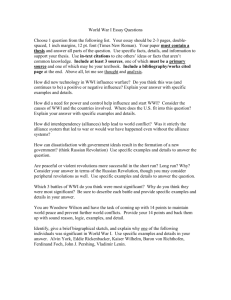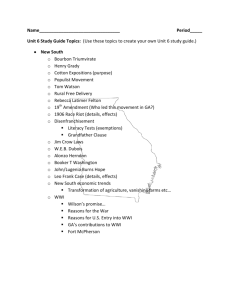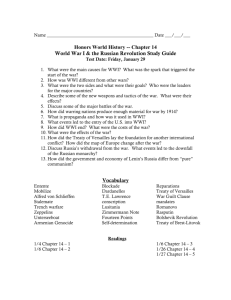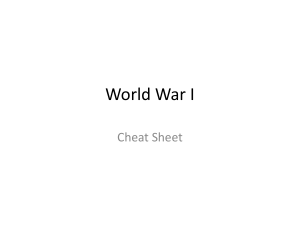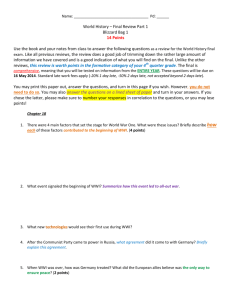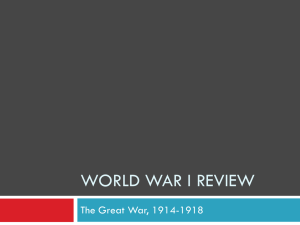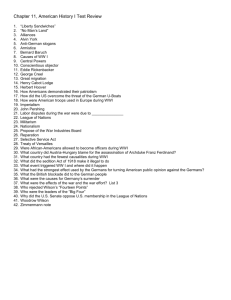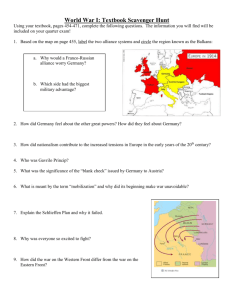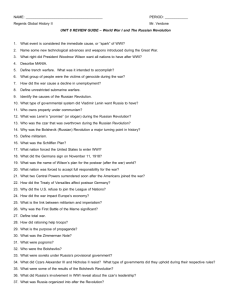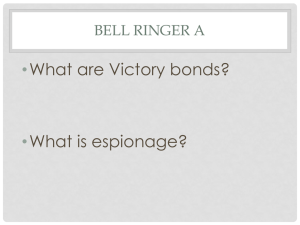WORLD HISTORY VOCABULARY UNIT 5 * WORLD WAR I
advertisement
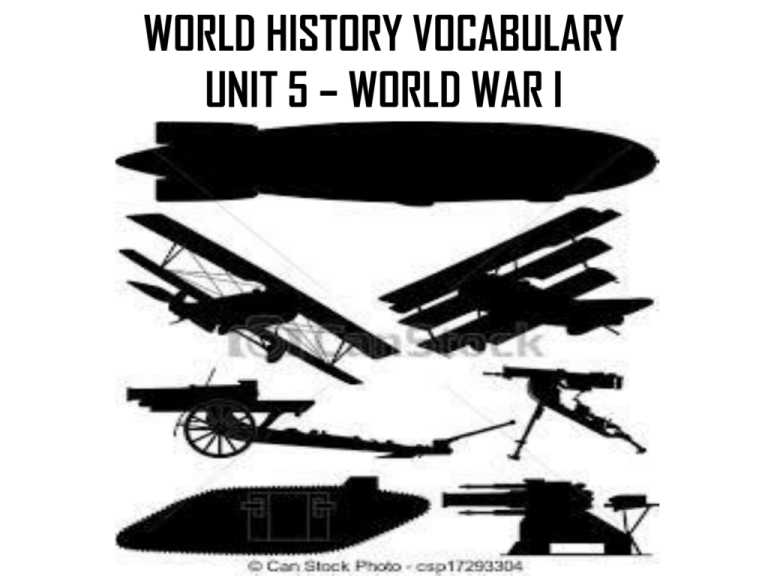
WORLD HISTORY VOCABULARY UNIT 5 – WORLD WAR I THE PARTICIPANTS • Triple Alliance Alliance between Germany, Italy, Austria Hungry • Triple Entente An alliance between Great Britain, France and Russia in the years before WWI. • Alexandra Last Tsarist of Russia, had a son who was a hemophiliac, and was put under the influence of Rasputin, where he exploited her. Ended up causing the collapse of the Tsars • Grigori Rasputin a Siberian preacher who became friends of the Tsars, but hated by the public, twisted and cheated and exploited Alexandra. • Archduke Francis Ferdinand heir to the throne of Austria Hungary; assassinated by Gavrilo Princip, a bosnian serb.; sparked WWI • General Alfred von Schlieffen had helped draw up the plan for the German military; known as the Schlieffen Plan, it called for a two- front war with France and Russia since the two had formed a Rasputin – The Mad Monk THE PLAYERS (people) OF WWI: • Gavrilo Princip Member of a terrorist organization called The Black Hand. Helped to end the optimistic Progressive era in America. Murdered Archduke Franz Ferdinand and his wife. Wanted to set Bosnia free from Austria-Hungary • Emperor William II German emperor who gave Austria-Hungary a "blank check," promising Germany's full support if war broke out between Russia and AustriaHungary • Czar Nicholas II Russian Czar during WWI; unpopular with Russian people; overthrown in March 1917; executed by Bolsheviks after November during Russian Revolution • Lawrence of Arabia British officer who helped lead Arab revolt in 1917 that allowed British army to sweep in and break up Ottoman Empire • Erich Von Ludendorff Guided German military operations, decided to make one final military breakgamble- grand offensive in the west to break the military stalemate. His gamble failed. Czar Nicholas II – would be executed MORE PLAYERS (people) of WWI: • Admiral Holtzendorf German admiral who assured Emperor William II that the Americans would not intervene in the war and, if they did, they would not land on the continent. He and the others were wrong when the U.S. joined the war in April, 1917. • Woodrow Wilson 28th president of the United States, known for World War I leadership, created Federal Reserve, Federal Trade Commission, Clayton Antitrust Act, progressive income tax, lower tariffs, women's suffrage (reluctantly), Treaty of Versailles, sought 14 points post-war plan, League of Nations (but failed to win U.S. ratification), won Nobel Peace Prize WOODROW WILSON – USA PRESIDENT EVEN MORE PLAYERS (people) OF WWI: • Alexander Kerensky Headed the Provisional Government in 1917. Refused to redistribute confiscated landholdings to the peasants. Thought fighting the war was a national duty. • V.I.Lenin Led the communist revolution, was the leader of the Bolsheviks, ruled Russia, Believed in Marxist Socialism: 1) Believed capitalism must be destroyed. 2) A social revolution was possible in backward Russia. 3) The need for highly trained workers partly controlled by revolutionaries like himself. • Leon Trotsky Russian revolutionary and Communist theorist who helped Lenin and built up the army • David Lloyd George He was the British representative at the Paris Peace Conference in 1919. He pushed for a revenge-based treaty at Versailles, hampering the 14 points. • Georges Clemenceau French statesman who played a key role in negotiating the Treaty of Versailles (1841-1929) • Friedrich Ebert after William II left, he rules the Social Democracy and announces a democratic republic in Germany VLADIMIR LENIN – father of Communist Russia THE BATTLES OF WWI: • Marne Battle near Paris that ended Germany's hope of swift victory • Verdun A battle in WWI. Is considered some of the bloodiest fighting in WWI and the German offense was stopped; offensive battle on the western front initiated by Germany in which they hoped to crush France and taken them out of the war, however France was in a very good defensive position and French held it for 10 months. Nearly a million killed. French drew reserve troops from the Somme to help defend. No territory was gained; Battle in WWI that ended in massive casualties and had little direct result VERDUN – WWI’s DEADLIEST BATTLE: MORE BATTLES: • Tannenburg In 1914 during World War I a German army under the command of Field Marshal Paul von Hindenburg won an important victory over two Russian armies in the Second Battle of Tannenberg who had invaded East Prussia. • Gallipoli A poorly planned and badly executed Allied campaign to capture the Turkish peninsula of Gallipoli during 1915 in World War I. Intended to open up a sea lane to the Russians through the Black Sea, the attempt failed with more than 50 percent casualties on both sides. THE ALLIES’ MISTAKE AT GALLIPOLI: THE THEATRES (PLACES) OF BATTLE: • Serbia Small European nation in which an Austro-Hungarian heir was killed, leading to the outbreak of WWI • Bosnia an Austrian province • Masurian Lakes At the beginning of the war, the Russian army moved into eastern Germany but was decisively defeated at the Battle of Tannenberg on August 30 and the Battle of Masurian Lakes on September 15. As a result of these defeats, the Russians were no longer a threat to German territory. BATTLE OF TANNENBURG -- AUG. 1914 MORE THEATRES (places) OF WWI: • Petrograd capital city of Russia during World War I; formerly (and today) known as St. Petersburg. • Siberia a region of central and eastern Russia, stretching from the Ural mountains to the pacific ocean, known for its mineral resources and for being a place of political exile. • Urals the czar, his wife, and five children were moved to a mining town in this after the czar abdicated PETROGRAD IN RUSSIA & STILL MORE PLACES OF WWI: • Kiel German town where sailors mutinied on November 3, 1918 • Alsace French province that used to belong to Germany, where people speak both French & German • Lorraine region of France taken by the Germans in 1871; returned to France after World War I • Poland a republic in central Europe POLAND DURING WWI: MORE TERMINOLOGY OF WWI: • total war A war that involves the complete mobilization of resources and people, affecting the lives of all citizens in the warring countries, even those remote from the battlefields. • Planned Economies an economic system directed by government agencies • Soviets a Russian council composed of representatives from the workers and soldiers. • Bolsheviks Led by Vladimir Lenin it was the Russian communist party that took over the Russian government during WWI • War Communism in World War I Russia, government control of banks and most industries, the seizing of grain from peasants, and the centralization of state administration under Communist control OTHER DETAILS • Conscription compulsory military service • Propaganda ideas spread to influence public opinion for or against a cause • Trench Warfare Fighting with trenches, mines, and barbed wire. Horrible living conditions, great slaughter, no gains, stalemate, used in WWI. • War of Attrition Trench warfare between Germany and France. Called War of Attrition(wearing down) because the goal was to break down the enemy. There was no winner after 3 years of fighting. • Mandates The Treaty of Versailles established British or French control over territories formerly held by Germany and the Ottoman Empire; especially important in regard to Arab areas after the war. • Mobilization act of assembling and putting into readiness for war or other emergency: "mobilization of the troops“
